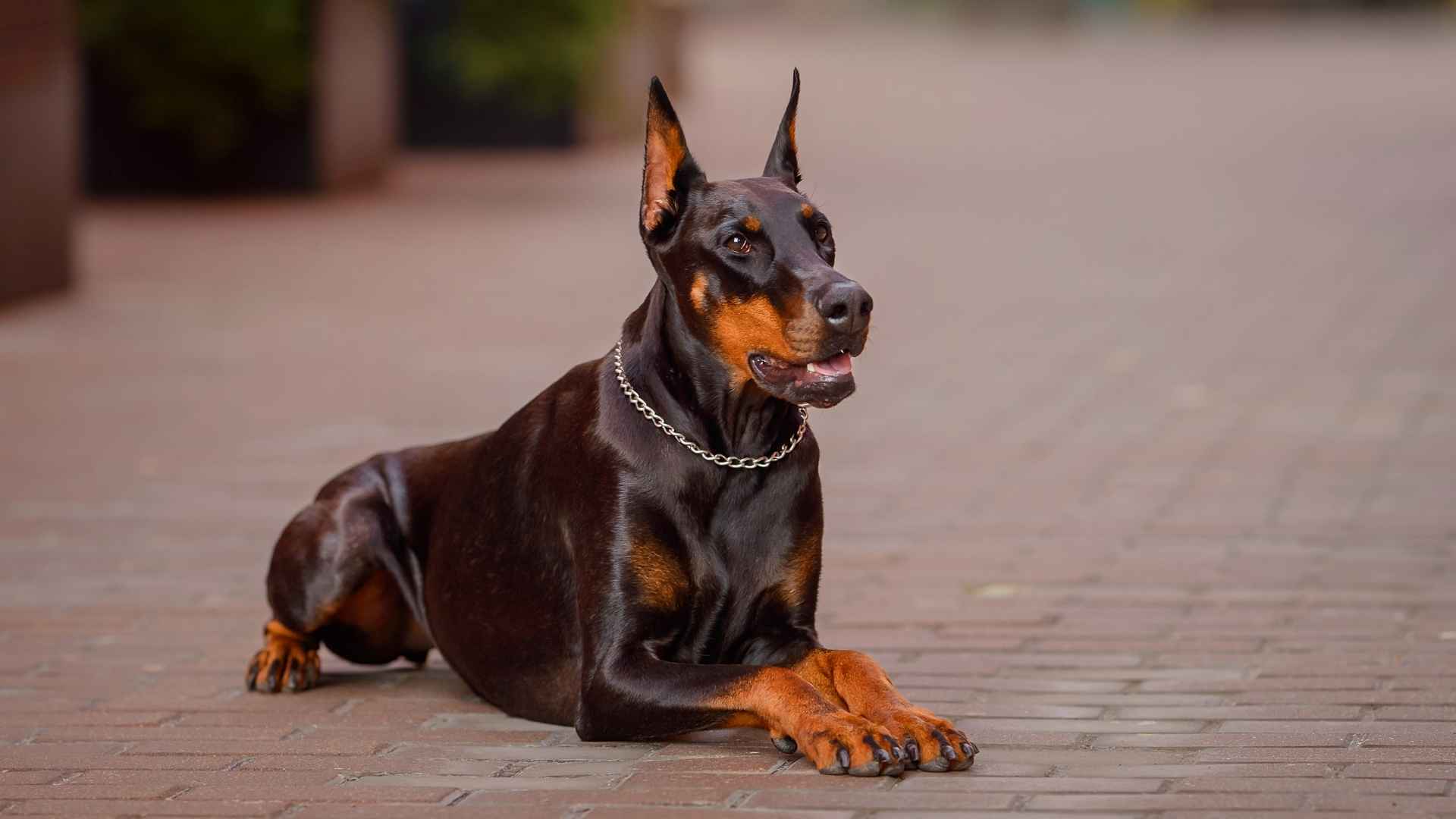Some dogs are born with courage in their veins. Whether guarding homes, protecting livestock, or standing between their family and danger, brave dog breeds have an instinctive drive to keep their loved ones safe. Their loyalty runs deep, and when faced with a threat, they step forward without hesitation.
Protective instincts in dogs aren’t just about size or strength—they’re about awareness, intelligence, and heart. These dogs are naturally watchful, quick to assess situations, and confident enough to take action when needed. With proper training and socialization, their bravery turns into a calm, reliable kind of protection rather than unnecessary aggression.
If you’re looking for a loyal companion who will love you fiercely and keep a watchful eye over your family, these courageous dog breeds stand out. They’re not just pets; they’re devoted guardians who embody trust, love, and an unshakable bond with their humans.
Brave Dog Breeds with Protective Instincts
Here are the most protective dog breeds:
1. German Shepherd
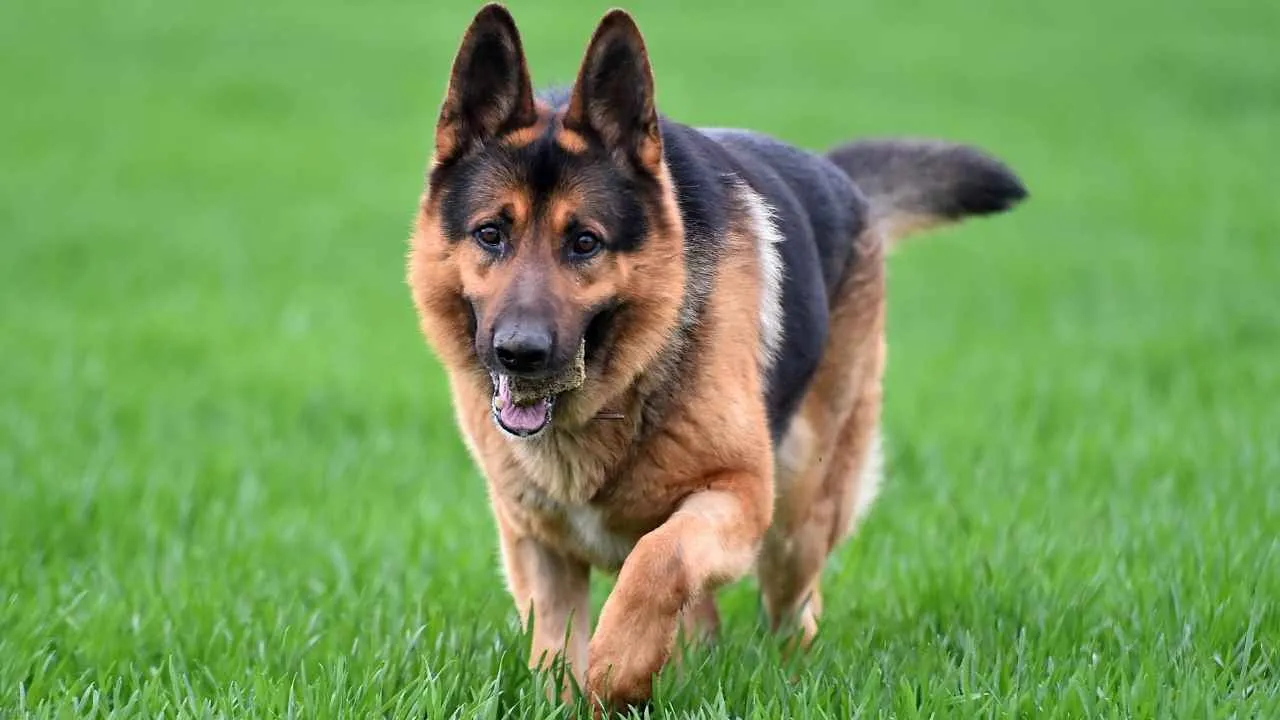
German Shepherds are the gold standard when it comes to brave dog breeds with protective instincts. Originally bred to guard livestock, these dogs have evolved into multi-talented working companions known for their sharp intelligence, physical power, and unwavering dedication.
Their confidence, combined with a deep emotional bond to their handlers, makes them excellent guard dogs both on the job and at home. Whether they’re helping detect explosives or keeping an eye on the kids, German Shepherds operate with purpose and precision.
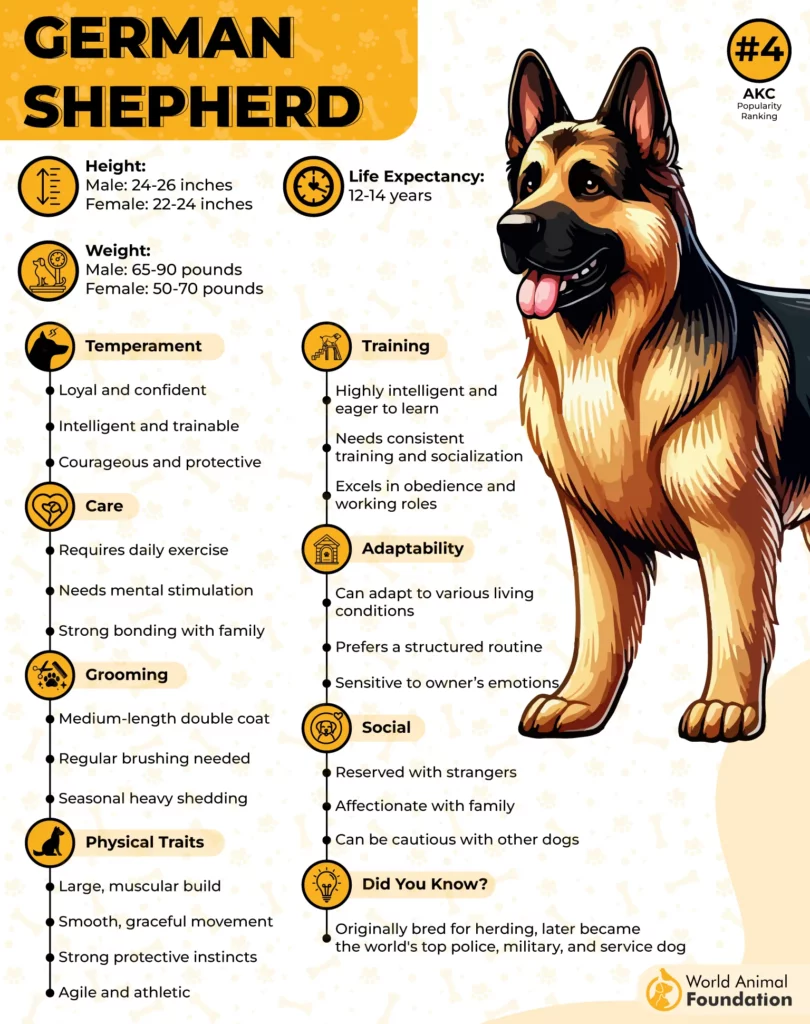
Unique Protective Traits
Highly intelligent: German Shepherds are among the smartest dog breeds, capable of making decisions under pressure.
Strong sense of duty: According to PetMD, these dogs form strong bonds with their humans and will step into protective mode without hesitation.
Keen awareness: With sharp hearing and a powerful nose, they can identify potential threats before they’re even visible.
Training and Temperament
Natural guarding instincts: German Shepherds don’t just respond to training—they’re naturally protective and eager to work.
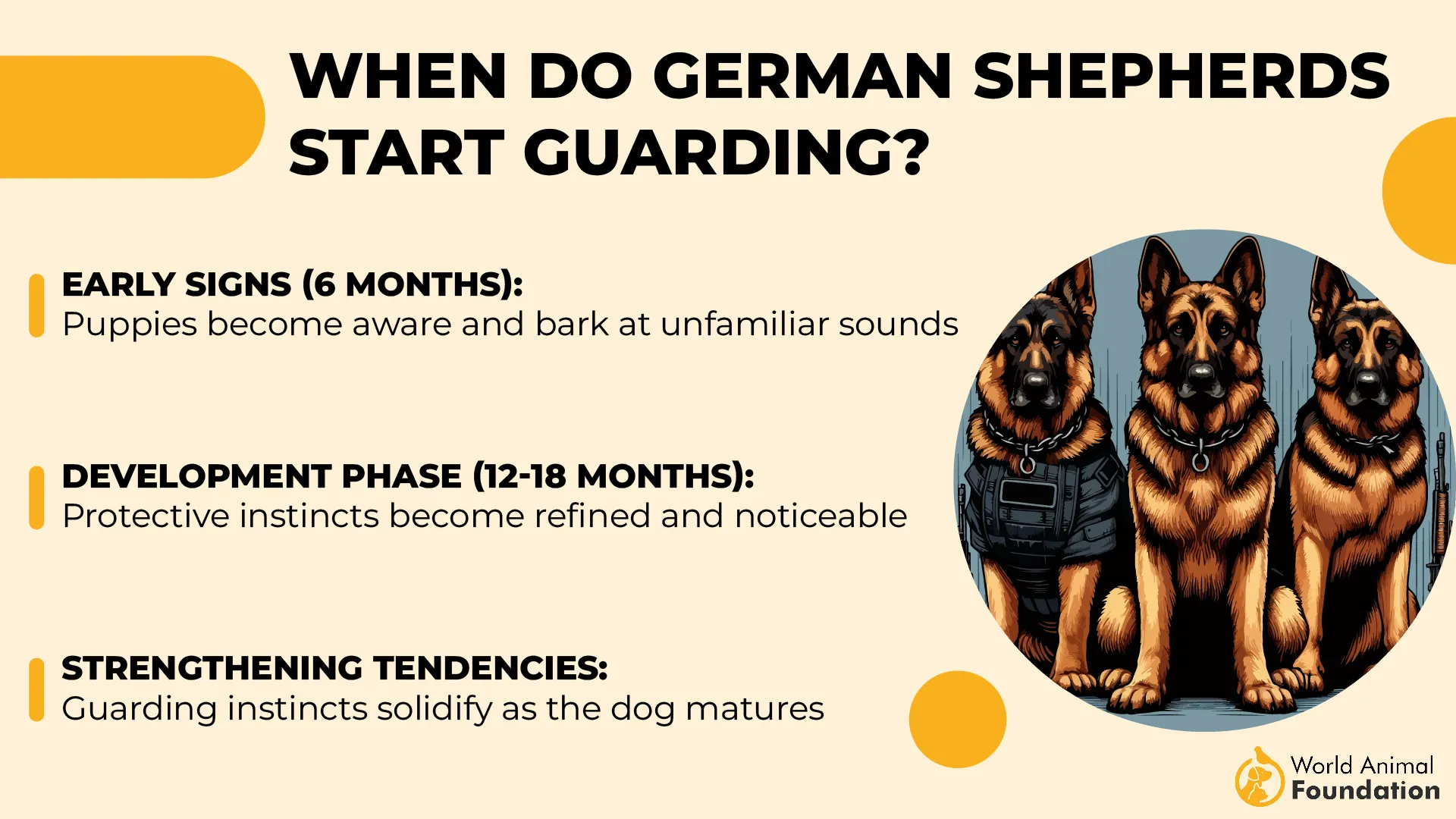
Quick learners: They thrive on mental stimulation and can master complex commands quickly with consistent training.
Balanced demeanor: Despite their power, they maintain a calm demeanor when properly socialized and exercised.
Is This the Right Dog for You?
Ideal for active families: These are versatile dogs that need mental and physical outlets every day.
2. Rottweiler
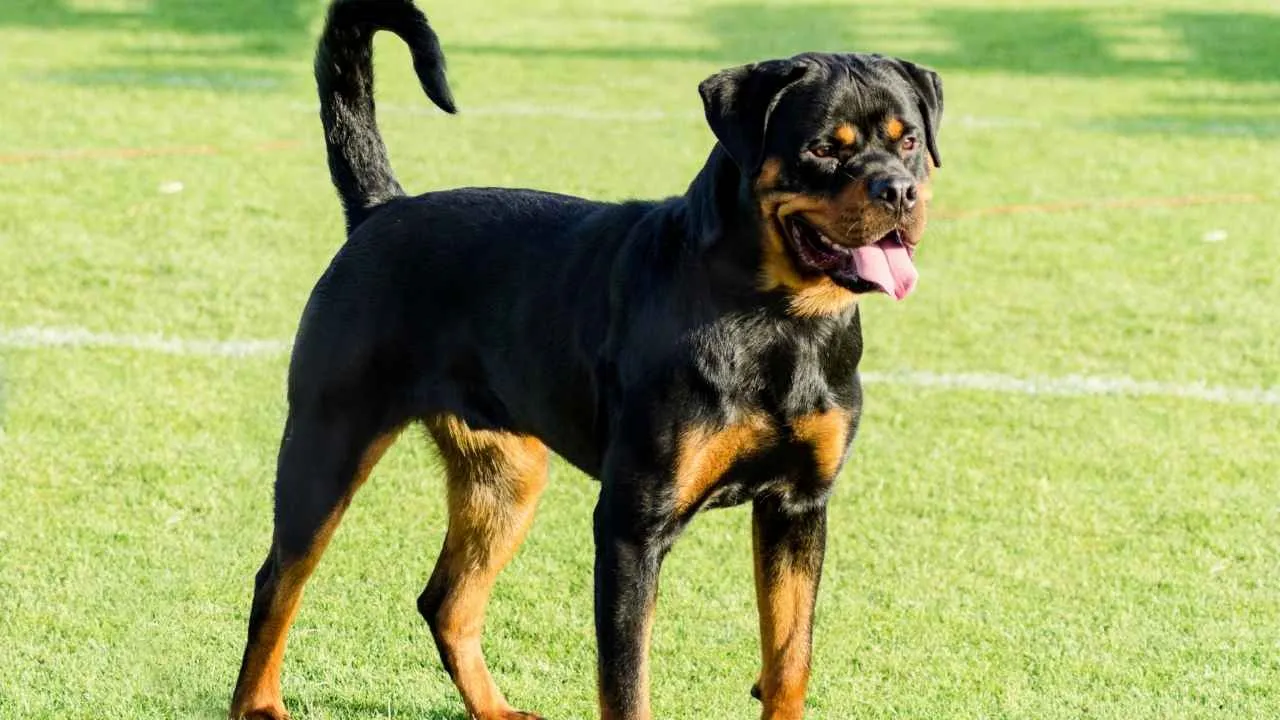
Rottweilers carry the legacy of ancient Roman drover dogs, bred to move and protect livestock across miles of conquered land. Today, that instinct translates into a loyal and protective dog with a commanding presence and an innate awareness of its surroundings.
While their physique and stare can be intimidating, Rottweilers are often affectionate and deeply bonded with their families. They’re the type of dog that watches everything—and reacts only when necessary.
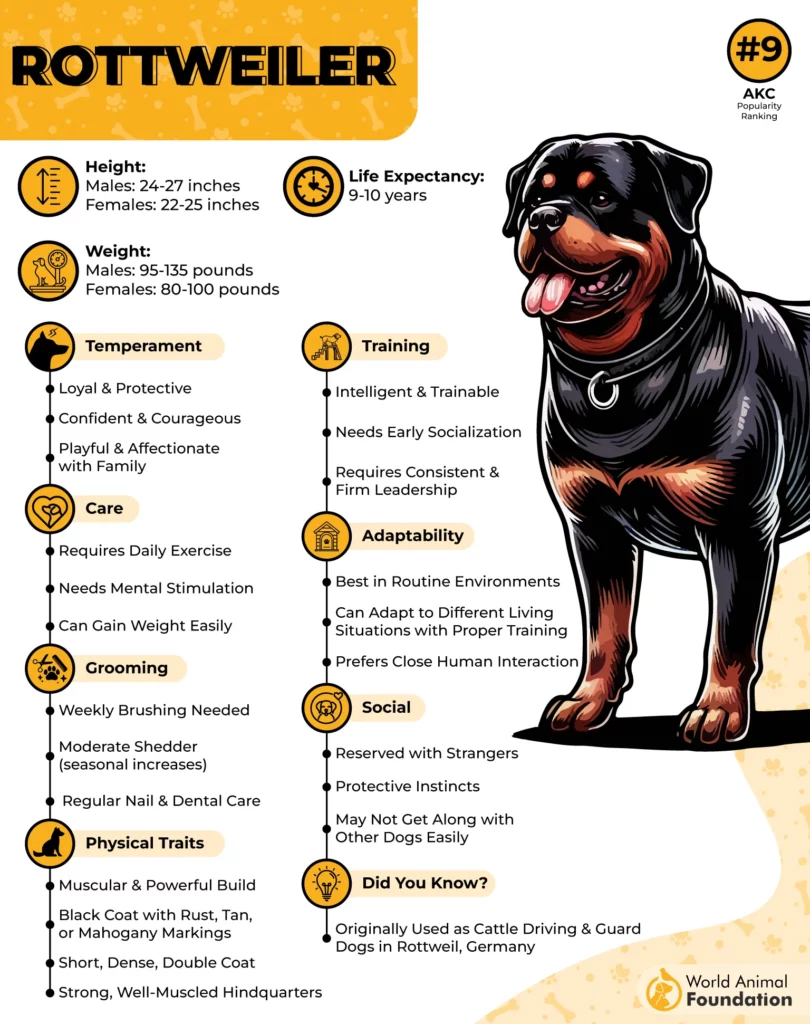
It’s this ability to stay composed under pressure that makes them such great guard dogs in both professional and personal settings.
Unique Protective Traits
Innate territorial awareness: Rottweilers have a strong instinct to protect their home and loved ones from perceived threats.
Impressive physical strength: Their sturdy build and muscular dog status make them capable of handling physical confrontations if needed.
History of guardianship: From guarding butcher carts to family homes, they’ve been reliable protection dogs for centuries.
Training and Temperament
Early socialization is key: Rottweilers thrive with proper socialization, helping them distinguish friend from foe without overreacting.
Responsive to structured routines: They benefit from consistent training that emphasizes calm confidence and self-control.
Is This the Right Dog for You?
Best for confident dog owners: They need leadership and boundaries from someone experienced with large dogs.
3. Doberman Pinscher
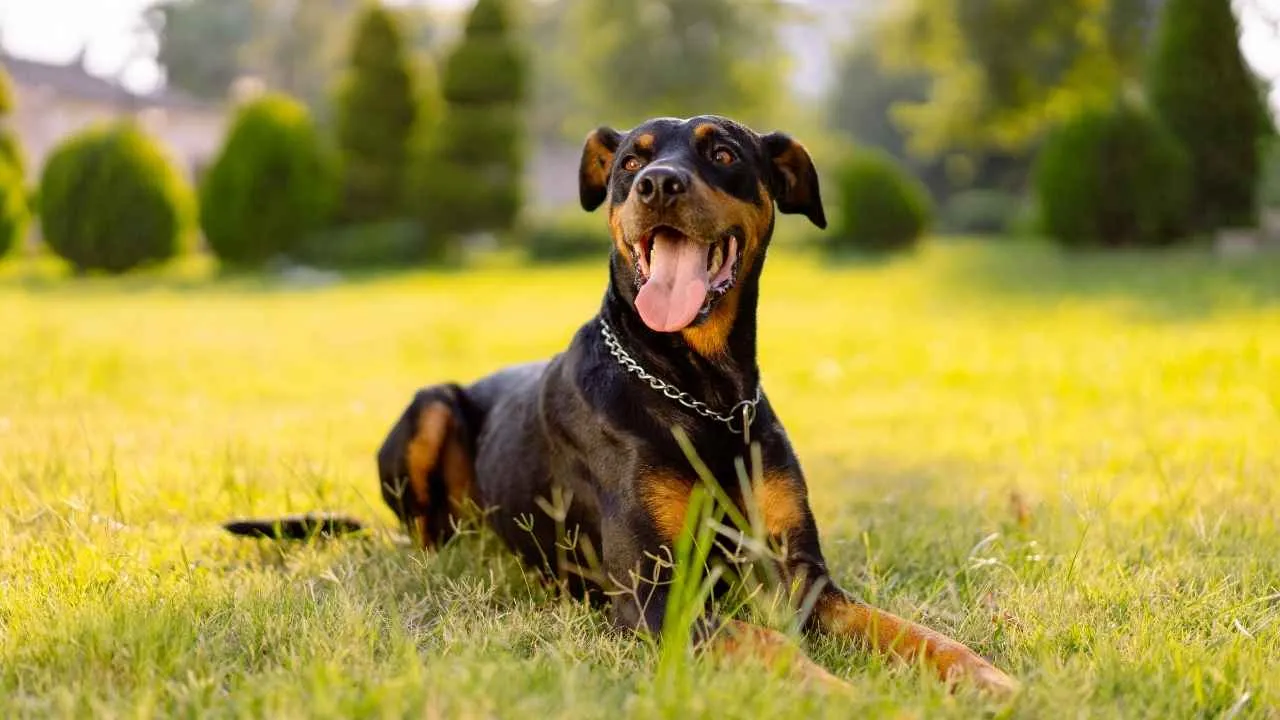
The Doberman Pinscher is the embodiment of purpose and precision. With a sleek silhouette and laser-sharp focus, this breed was originally bred to be a protector with brains and brawn—capable of intimidating intruders while staying completely tuned into its handler.
Despite their no-nonsense look, Dobermans are surprisingly affectionate with their family members and form strong bonds that last a lifetime. Their energy, intelligence, and loyalty make them some of the best guard dogs for those seeking a mix of power, elegance, and emotional connection.
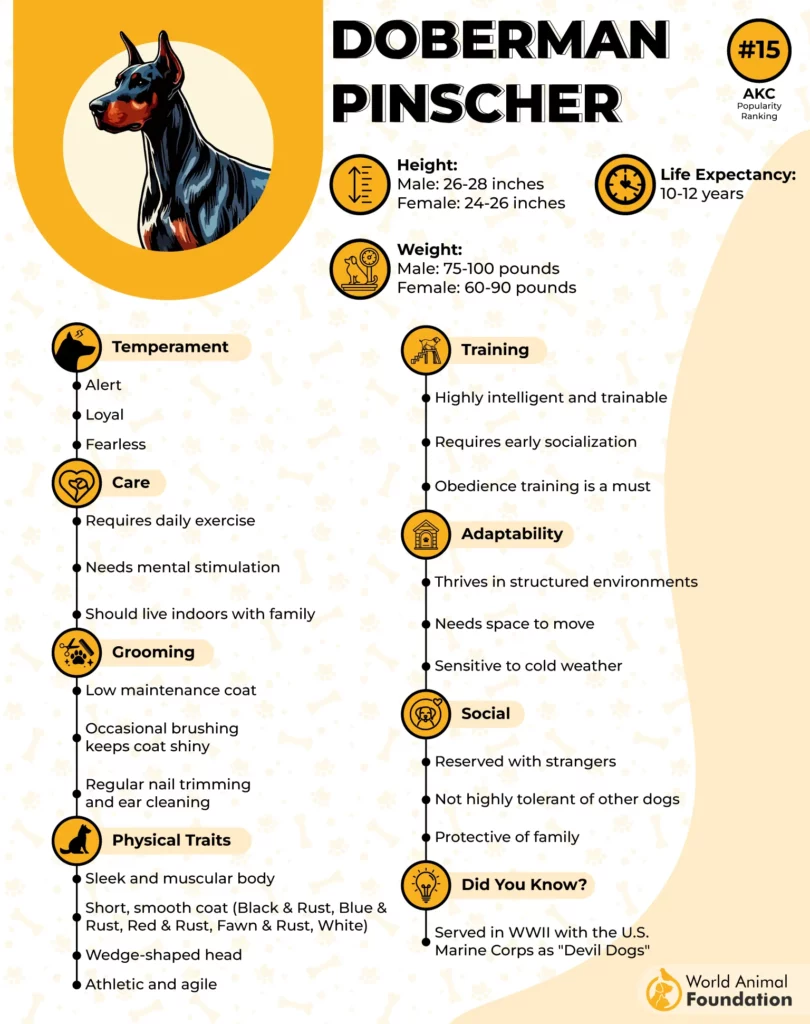
Unique Protective Traits
Fast-reacting guardians: Their agility and alertness allow them to respond instantly to potential threats.
Commanding posture: A Doberman’s presence alone often deters intruders, thanks to their upright stance and focused expression.
Protective but discerning: These are naturally protective dogs that won’t lash out without cause—they assess situations before acting.
Training and Temperament
High work drive: With a strong desire to stay busy, Dobermans excel in structured environments that offer mental stimulation and purpose.
Reliable under pressure: Bred for precision, they stay calm in tense situations and are ideal for advanced roles like police work or search and rescue.
Adaptable with guidance: When given proper training, they can adjust to different home settings, even coexisting peacefully with other dogs and pets.
Is This the Right Dog for You?
Great for experienced handlers: Their drive and intelligence make them best suited for someone comfortable with high-energy, highly trainable breeds.
4. Belgian Malinois
The Belgian Malinois is a living rocket—fast, agile, and laser-focused on the task at hand. While often confused with other shepherd breeds, the Malinois stands apart for its unmatched intensity and drive.
These natural guard dogs thrive in high-pressure environments where they can put their skills to use. From military service to elite security detail, the Malinois doesn’t just follow commands—it anticipates them.
What makes them stand out is their nonstop energy paired with a deep emotional sensitivity, allowing them to bond hard with their handlers and remain fully alert to even the smallest shift in mood or movement.
Unique Protective Traits
Elite tactical performer: This breed has been trusted by Navy SEALs and military operations worldwide due to its precision and control under stress.
Incredible agility: Their speed and reflexes allow them to cover ground and engage faster than most other dogs.
Unshakable focus: The Malinois is always scanning, alert, and ready to engage—making them one of the most protective dog breeds in elite circles.
Training and Temperament
Requires high-level stimulation: These dogs demand more than a walk—they need intense mental stimulation and structured challenges.
Emotionally perceptive: Their ability to read and react to human emotions makes them excellent therapy pets as well as guards.
Intensely bonded: They form deep bonds with one handler and don’t take well to rehoming or inconsistent environments.
Is This the Right Dog for You?
Perfect for working environments: Whether it’s agility trials, scent detection, or guarding estates, they’re in their element when working.
5. Bullmastiff
The Bullmastiff is the classic estate guardian—quiet, composed, and built like a fortress. Developed by English gamekeepers to track and subdue intruders without unnecessary force, this breed walks the line between power and gentleness.
While their imposing presence can stop strangers in their tracks, they’re soft-hearted with the people they love. Bullmastiffs are especially protective of small children, often standing guard like silent sentinels.
Unique Protective Traits
Silent strength: Known for their ability to deter intruders without barking, Bullmastiffs rely on sheer presence and strategic thinking.
Protective without aggression: These protective dogs were bred to guard estates by pinning threats rather than attacking—controlling the situation without chaos.
Instinctive positioning: They often place themselves physically between their humans and any perceived danger, a classic sign of their natural protective instincts.
Training and Temperament
Naturally even-tempered: With a calm demeanor, Bullmastiffs respond well to firm, positive reinforcement rather than harsh corrections.
Stubborn streaks: They can be willful, so early socialization and structured routines are key to shaping respectful behavior.
Low-maintenance care: Their thick coat is short and easy to groom, which makes upkeep easier than other large dog breeds.
Is This the Right Dog for You?
Great for quieter households: These dogs aren’t high-energy—they’re watchers, not runners—making them ideal for relaxed environments.
6. Akita
The Akita isn’t just a dog—it’s a guardian with a samurai’s soul. Bred in Japan for strength, bravery, and unshakable loyalty, the Akita commands respect without ever needing to raise its voice. Reserved around strangers but deeply connected to its family, the Akita operates with quiet watchfulness, ready to respond decisively if danger appears.
These dogs aren’t attention-seekers—they’re stoic, self-contained, and often regarded as loyal companions who defend without hesitation. An Akita’s protective nature isn’t loud—it’s steadfast, intense, and grounded in centuries of service and symbolism.
Unique Protective Traits
Natural guardians: Akitas have an innate ability to detect potential threats, and they do so silently, relying more on presence than noise.
Fearless defenders: Their lineage includes hunting bears and boars, making them some of the bravest dogs ever bred.
Cultural symbols: In Japan, Akitas are gifted to represent health and protection—a nod to their deep-rooted instinct to protect.
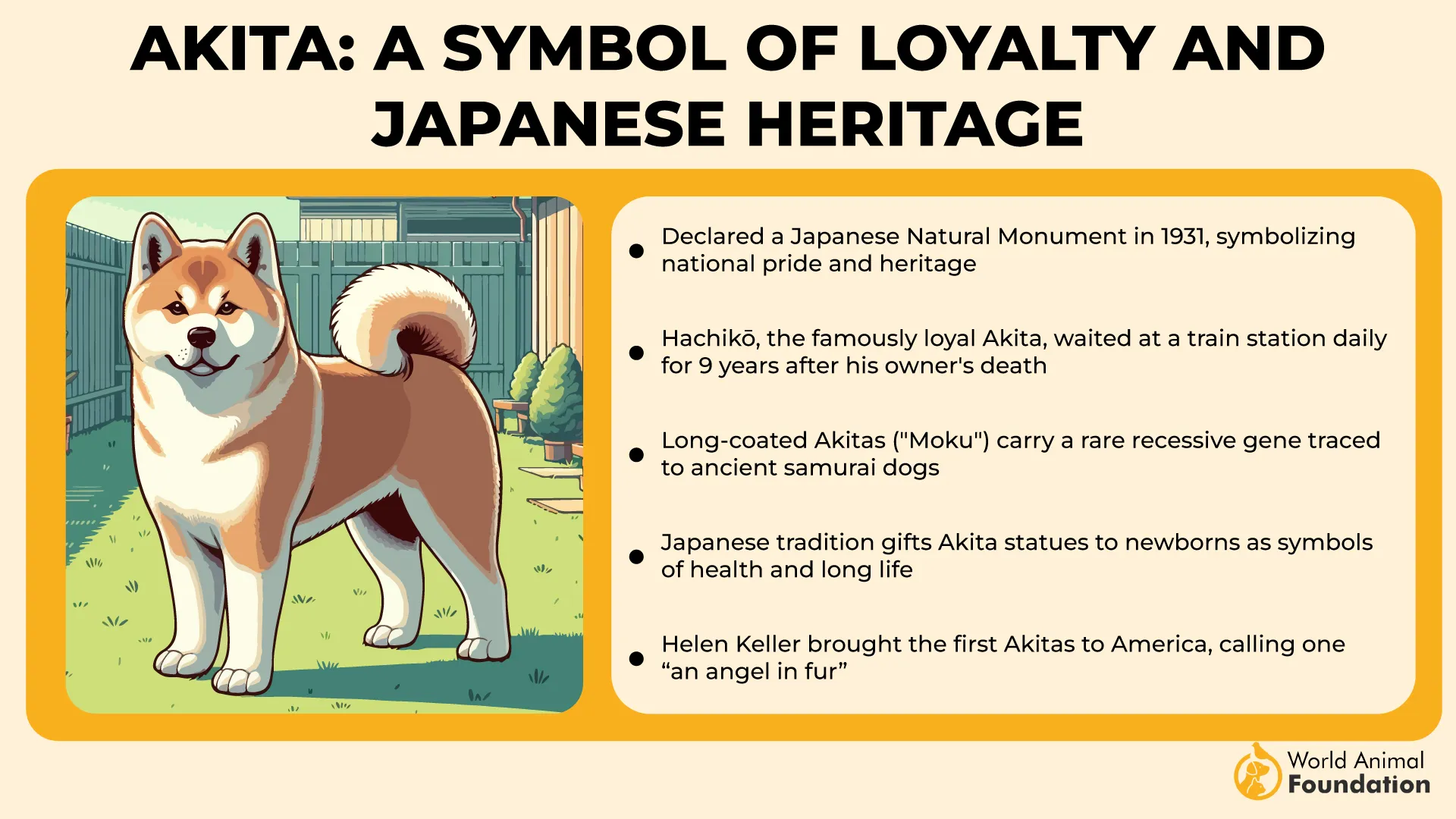
Training and Temperament
Independent thinkers: Akitas aren’t eager to please in the traditional sense—they’re intelligent and like to assess before obeying.
Best with calm leadership: These dogs respond to proper training when it’s delivered with calm authority, not force.
Clean and composed: Akitas are known as clean dogs who often groom themselves like cats and dislike disorder in their environment.
Is This the Right Dog for You?
A strong, silent protector: If you’re looking for a naturally protective, elegant, and deeply loyal dog who watches more than barks, this is your warrior.
7. Boxer
Boxers bring a unique twist to the world of protective dog breeds—equal parts goofy and grounded. Originally bred in Germany for hunting and guarding, these muscular, athletic dogs pack serious speed and power beneath their playful exterior.
What sets them apart isn’t just their strength—it’s their deep loyalty combined with a childlike enthusiasm for life. With natural guarding instincts and a strong desire to be close to their people, Boxers are always ready to shift from playmate to protector in a split second.
Unique Protective Traits
Instant response mode: Boxers have a rapid ability to switch from fun to protective mode when they sense anything suspicious.
Built for action: Their muscular dogs build and explosive speed (up to 45 mph) give them a major edge when confronting danger.
Protective yet patient: They’re known for watching over small children with the attentiveness of an older sibling—protective, but never overbearing.
Training and Temperament
Smart and trainable: Boxers are highly intelligent, picking up commands quickly when training is positive and engaging.
Emotionally expressive: These dogs wear their hearts on their sleeves—if they love you, you’ll know it.
Playful watchdogs: Despite their clownish nature, Boxers maintain strong alertness, making them great guard dog candidates without being aggressive.
Is This the Right Dog for You?
A blend of heart and muscle: If you want a protector that doubles as a family comedian, the Boxer checks both boxes—loyal, watchful, and always up for a game.
8. Giant Schnauzer
The Giant Schnauzer is a no-nonsense guardian with both brains and brawn. Originally bred in Germany to guard breweries and herd livestock, this breed brings a commanding presence and serious work ethic to any home.
What sets the Giant Schnauzer apart isn’t just its size or its intense stare—it’s the breed’s ability to think critically under pressure. These dogs don’t just bark at the mailman—they evaluate, react, and often get there before you even know something’s wrong. With a sharp mind and an instinct to watch and defend, this breed is built for vigilance and loyalty.
Unique Protective Traits
Intensely territorial: These dogs take their job seriously and will guard their home and family members with unwavering resolve.
Strategic defenders: Rather than react impulsively, they rely on their strong instincts to assess situations before responding.
Formidable presence: Their large frame and signature beard give them a striking, memorable look that deters intruders on sight.
Training and Temperament
Mentally driven: Giant Schnauzers crave mental stimulation just as much as physical activity and can get bored without enough challenge.
Quick learners with opinions: They’re highly trainable, but their independent streak means training needs to be consistent and engaging.
Early socialization required: These protective dog breeds need structured exposure early on to distinguish between real threats and harmless visitors.
Is This the Right Dog for You?
Thrives with structure and activity: They need a job—whether it’s agility training, obedience work, or patrol duty, idle time leads to frustration.
9. Anatolian Shepherd
The Anatolian Shepherd is less of a pet and more of a living fortress. Originating in the rugged terrain of Turkey, this breed was originally bred to guard livestock from apex predators—think wolves, jackals, and yes, even bears. These are not dogs that wait for permission.
With an unshakable confidence and independent decision-making ability, the Anatolian doesn’t just defend—it dominates. Despite their stoic exterior, they are deeply committed to the people and animals in their care, forming strong attachments without being overly demonstrative.
Unique Protective Traits
Lone decision-makers: This breed doesn’t wait for cues; they act on their own when they sense potential threats, especially in rural or isolated settings.
Intimidating yet silent: They often operate like a fearless protector—minimal barking, but total readiness to defend when necessary.
Keen territorial sense: Anatolians treat their home and flock as sacred ground, alert to any unfamiliar presence long before others notice.
Training and Temperament
Strong-willed and independent: These dogs need a handler who respects their instincts while reinforcing boundaries through consistent training.
Early exposure matters: Proper socialization from a young age is essential to help them distinguish between real danger and normal interaction.
Not your average watchdog: Their calm, almost aloof demeanor masks a deeply ingrained instinct to protect that activates in an instant.
Is This the Right Dog for You?
Ideal for rural settings: The Anatolian thrives in open spaces where their guarding talents can shine—think farms, ranches, or large properties.
Conclusion
They may be known as gentle giants, but these dogs carry an instinctual edge that sets them apart as natural protection dogs. What defines them isn’t just their size or strength, but a fearless nature that kicks in the moment something feels off. They don’t hesitate—they assess, respond, and defend with quiet confidence.
Yet, for all their guarding instincts, they are deeply loving dogs. Around their people, they’re calm, affectionate, and often surprisingly tender. They often form strong connections not only with humans but with other pets, showing a balanced temperament that adapts to the energy of the home.


